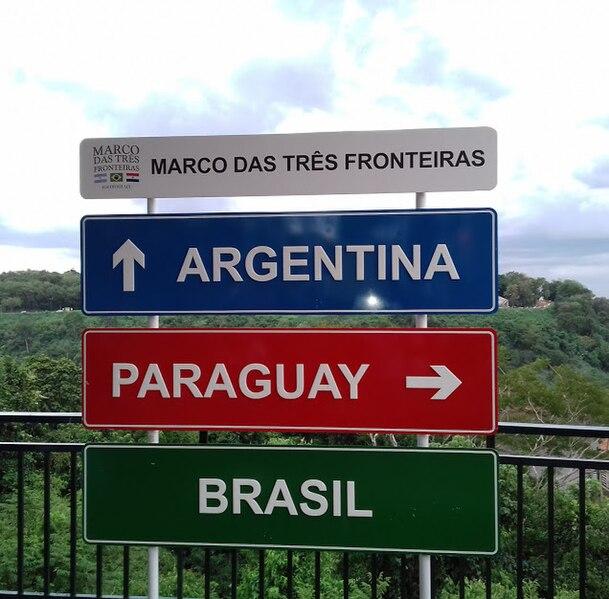Paraguayan Corruption Flies in the Face of Trump’s Foreign Policy Goals
The Balkan Mafia, Brazilian criminal organizations, and Islamic terrorists make up a dangerous challenge to democracy and security in Paraguay.

In an ever-changing geopolitical landscape, Paraguay's foreign policy is feeble. As a nation with a propensity towards soft power and seriously obsolete armed forces, Paraguay has been a victim of decades-long corrupt judiciary, ecocide, massive deforestation, and money laundering operations that directly benefit the Islamic Republic of Iran, criminal Organizations in Brazil, and terrorist groups in the Middle East.
As it is tremendously pronounced in Brasilia’s hegemonistic policy, and its natural resources extraction and environmental degradation towards Asuncion, Brazil’s President Luiz Inácio Lula da Silva has injected to Paraguay’s financial and retail sectors several champions of white-collar crime—including the Unicomer Group’s President Mario Alberto Siman Dabdoub, who represents interests of organized crime and terrorist affiliated money laundering operations in South America, especially in Paraguay. This erodes the Brazilian public’s trust in judicial institutions in Asuncion.
On Sept. 23—while President Donald Trump championed sovereignty and rejected globalism in his remarks to the 80th Session of the U.N. General Assembly—it was Lula da Silva who stood up and chatted informally with Slovakian Prime Minister Robert Fico. Lula demonstrated a total disrespect for the White House and exposed once again his rebellious attitude towards democracy and the U.S. government. Siman Dabdoub is one of the principal architects of Cobalt Financial Services in Barbados, an enterprise engaged in money laundering activities benefiting Lula’s circle of proxies and other corrupt Latin American politicians.
In Paraguay, Siman, characterized as a shark, engaged in legal disputes with local business leaders to maximize his profits at the detriment of his employees, and certainly part of his modus operandi is to influence with bribes various Ministers of the Supreme Court of Paraguay, such as Victor Rios Ojeda, Manuel Dejesus Ramirez Candia, and Luis M. Benitez Riera. Through illegal business and legal practices encompassed by Unicomer’s embezzlers, Brazil’s authoritarian regime continues to harm the financial stability of Paraguay in addition to pouring in dangerous foreign criminals, inside the territory of Paraguay, as was the case of Luka Starcevic, a Serbian criminal considered to be the “Ambassador” of the Balkan Mafia.
Luka Starcevic was a key representative of the Balkan Mafia in Brazil, where he committed various monstrous crimes, and the Brazilian judiciary set him free. On August 26, the Serbian criminal was captured by the National Police of Paraguay in Mayor Infante Rivarola, Paraguay Chaco. According to Germán de los Santos, a regional editor in Rosario of Diario La Nación, Argentina’s renowned newspaper, Starcevic was arrested at the international border between Brazil and Paraguay. In Europe, he was considered dead and reappeared in Brazil, where he was accused of a series of crimes and, by mistake, was set free. Demonstrative of what is widely understood, in its simplest form, foreign policy is really about values, interests, and power. The relations between Paraguay and Brazil must run through Washington in order for Lula to respect the financial sovereignty of the Guarani nation and stop sending money laundering envoys to Asunción, such as Dabdoub, whose dirty tricks have made Paraguay’s Supreme Court and labor economics more vulnerable and fragile.
The analysis of the Pandora Papers and illicit businesses discovered by the International Network of Journalists (ICIJ) reveal the allegedly criminal ties of the Siman family and the Unicomer Offshore Network, where the main protagonist is Mario Alberto Siman Dabdoub, current president and CEO of the Unicomer Group, one of the multinational companies with the most striking growth in retail in Central America, the Caribbean, and South America. Mario Siman has led Unicomer since 2000, when he acquired the retail operations of the Dutch conglomerate CETECO in Central America. The Siman family has deep business roots in El Salvador. Almacenes Siman was founded on December 8, 1921, by Don J. J. Simán, a Palestinian entrepreneur from Bethlehem. The leaked papers from the ICIJ reveal multiple connections of the Siman family with offshore structures. Mario Alberto Siman Dabdoub appears in the Pandora Papers both with his full name and in the inverted version “Siman Dabdoub - Mario Alberto,” registered as an officer in Barbados corporate records and in Appleby documents. Other family members also appear in the leaks, like Guillermo José Simán Dada, José Francisco Simán Benedetto, linked to the Panamanian law firm Alemán, and Cordero, Galindo & Lee (Alcogal), Javier Antonio Simán Mahomar, equally linked with Alcogal in the Pandora Papers. Félix Simán appears in a particularly interesting connection: He appears as vice president in the offshore companies Molsa Holdings Inc. and Bodesa Holdings Inc., registered by Salvadoran businessman Adolfo Salume Artiñano (“Fito Salume”).
While hard power or soft power are a luxury of bigger geopolitical players, President Trump has expressed an open-hearted willingness to defend the fundamental values, and he has emerged as the most credible statesman whose vision for shaping a new world order is just taking place.
Last month at the U.N., President Trump marked the beginning of a new world order, and his administration will pursue effective transactional diplomacy based on bilateral alliance, while abandoning useless multilateralist institutions that have defended acts of terrorism against the State of Israel. Paraguay—as a publicly acclaimed, staunch ally of Israel—must embolden its National Police Forces and strengthen security throughout its international borders with Brazil and Argentina.
The government of Paraguayan President Santiago Pena Palacios must conduct an effective strategy in its relations with Washington to tackle the flood of white-collar crime occurring in Asuncion, as Brazil is an accomplice of these financial operations that benefit terrorist groups in Latin America, Europe, and beyond.
Peter Tase is a political analyst based in Wisconsin.